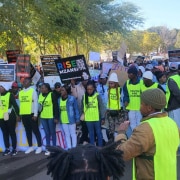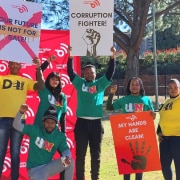|
Getting your Trinity Audio player ready...
|
The Portfolio Committee on Women, Youth and Persons with Disabilities is calling for written comments on the National Council on Gender-Based Violence and Femicide Bill [B31-2022].
The bill seeks to establish an independent, multi-sectoral national council which will co-ordinate and implement a coherent national strategic plan to end gender-based violence (GBV) and femicide. It was introduced to Parliament on 29 November 2022 and is currently before the National Assembly (NA) for consideration. Once it passes this stage it will go to the National Council of Provinces (NCOP), which may accept or reject it or propose amendments. If the NCOP passes the bill without amendments, it falls to the president to assent to and sign it, at which point it will become law and be promulgated on a date determined by the president. If the NCOP rejects the bill or proposes amendments, it goes back to the NA.
In the bill, provision is made for:
- establishment of the National Council on Gender-Based Violence and Femicide;
- the objects and functions of the council;
- appointment of a board;
- appointment of board members;
- the term of office of board members;
- termination of board membership;
- board meetings;
- establishment of board committees;
- appointment of the chief executive officer and secretariat;
- establishment of norms and standards for the provincial and local working groups;
- making of regulations;
- and other related matters such as vacancies, declarations of interest, and remuneration.
The board of the national council must comprise no more than 13 members, appointed in consultation with civil society, and in transparency and openness. At least 80% of board members must be female, and seven members must be from civil society organisations. The remaining six will be drawn from the departments of Women, Youth and Persons with Disabilities, Justice and Constitutional Development, Social Development, Health, Co-operative Governance and Traditional Affairs, and the South African Police Service.
The council must develop and implement a national strategic plan within six months of its establishment, use resources strategically and efficiently, set indicators with which all relevant stakeholders must comply, and monitor and evaluate the implementation of the plan. It must provide an inter-ministerial committee on GBV and femicide with regular reports on the progress of that implementation.
The plan must be reviewed every five years after roll-out.
Submissions can be e-mailed to Ms Neliswa Nobatana or submitted online, by no later than Friday, 19 May 2023 at 16h00. In your submission, kindly provide the name, surname, telephone number, and e-mail address of the person or organisation submitting the comments.
In addition to written submissions, oral submissions will be considered.
Enquiries can be directed to Ms Neliswa Nobatana on 083 709 8472.
All correspondence should be addressed to Ms CN Ndaba, Chairperson: PC on Women, Youth and Persons with Disabilities and marked for the attention of Ms N Nobatana.
Corruption and GBV
There is a strong corruption component to GBV, because vulnerable groups are more susceptible to corruption, and because some groups of women are often more vulnerable than men – they are therefore more likely to be adversely affected by corruption than those that are less vulnerable. The UN Office on Drugs and Crime (UNODC) has found that “women’s disadvantages in many areas of life result in greater vulnerability to corruption compared to men, who enjoy more power and protection, and better access to countervailing strategies, including the justice system”.
Furthermore, says the UNODC, corruption severely influences the extent to which women’s rights are ensured and protected.
Corruption Watch’s own research and analysis of reports received have shown women to be at a distinct disadvantage in areas such as dealing with the South African Police Service. Our police sectoral report, released in 2019, revealed allegations, especially in the Western Cape, that officers had a tendency to be overbearing and violent – especially to women.
Sexual corruption, or sextortion, is fast becoming one of the prevalent forms of corruption in this regard – the UNODC defines it thus: “sexual corruption entails using sex and the human body as the currency of corruption”.
In 2020, commenting on three GBV-related bills that were before Parliament at the time, we sent a submission in which we noted, among others, our receipt of “reports of sextortion taking place in schools, with teachers and principals soliciting sexual favours from learners in exchange for marks. We have also heard anecdotal accounts from women, of instances where government officials demand sexual favours in exchange for access to housing. Furthermore, we have been told of police demanding sexual favours from sex workers, in order for them to avoid arrest”.
These incidents revealed that sextortion was happening in at least three different sectors, and was likely to be more widespread than anyone realised. There is no reason to believe the situation has improved, three years later.








